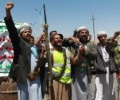Yemen is going backwards
Salman Aldossary /Asharq Alawsat/ Monday, 22 Sep, 2014
The Houthis will have no need to fight bloody battles to take over Yemen’s capital, Sana’a. The dangerous developments unfolding in the country suggest the Houthis have the upper hand over the government to such an extent that it gives one pause. No army and no state institutions will be able to resist. Even one of the largest and most prominent tribes in the country, the Hashid, were not able to confront the Houthis. Meanwhile, all the other powers in the country have retreated from the scene, leaving the Houthis to fill the resultant vacuum. They benefit as individual factions and groups, but the country as a whole loses out.
It is clear that Houthi leader Abdul Malik Al-Houthi has forged an alliance with one of the major power brokers from the regime of former president Ali Abdullah Saleh, which has helped him and his movement take over the capital in such a short space of time. What is even clearer is that Houthi has exploited all the flaws in the country’s institutions and political system, flaws which are due to Saleh and his regime. Houthi intends to widen his demands, including independence for the Houthis in decision-making, his movement being allowed to retain its arms, and their being consulted on all decisions coming from the country’s ministries. Even if the course of events is such that tensions escalate dramatically, Houthi will still be able to negotiate to form a Shi’ite, Houthi nation with ease. If he does attempt to do so, it is difficult to think of anyone who would stand against him. Has Yemen, as a result of Houthi’s actions, become like a haunted house taken over by a malign, evil spirit?
The effects of the legacy left by President Abd Rabbuh Manur Hadi’s predecessor Saleh have put Yemen on a road that seems to lead inevitably to the disintegration of the country. One of the worst of these effects is the quickly diminishing power of the Yemeni state, which has led a number of political groups to seek to overthrow it. One could even say that the Houthi leader’s power, the avenues open to him, his alliances, and his ability to impose his will on the ground, are greater than those possessed by the Yemeni state itself. As for Al-Qaeda, it is waiting for the final whistle in order to begin playing its own game, by forging links with the eventual winner of the current struggle, who by then will be exhausted from the battle and therefore helpless. Let us for a moment imagine a possible future scenario: the Houthis holding power on one side, Al-Qaeda on another, with a third group, the secessionists in the north, also in the picture—the Yemeni state, on the other hand, is completely absent from this scenario.
As for the UN’s Special Envoy to Yemen Jamal Benomar, despite taking up the post three years ago, he has no real achievements to his name. While Yemen’s president sees the Houthis as rebels plotting an armed overthrow of the state, Benomar sees things differently. He has never succeeded in getting them to make one political concession, and yet how many has the Yemeni state made as a result of his efforts? Even that last mysterious ceasefire agreement, which he brokered, was tailor-made for the Houthis. The latest fighting taking place in Sana’a right now suggests the Houthi rebels are unable to keep to any agreement, not to mention continuing their armed efforts against the state, despite the ceasefire agreement which has been announced. Who knows . . . today Benomar is negotiating with the Houthis; tomorrow, maybe Al-Qaeda. “United Nations,” indeed.
In their attempts to take over the state, the Houthis are using three main weapons to win over hearts and minds: first, calling for the reinstatement of fuel subsidies, a populist move par excellence; second, using “peaceful demonstrations,” true means to a false end, and which were peaceful at first but then transformed into something else, with attacks on the state television and radio building, and invasions of parliament and various universities; and, third—and this is strongest card in the Houthi hand—“reform,” a popular concept to say the least, and one which many groups compete to claim as their own cause, even if this so-called reform constitutes, in reality, taking over the state—something, of course, whose announcement will be delayed until the green light is obtained from the group’s main sponsor, Tehran.
Unfortunately, though, those who are truly betraying Yemen in this critical and dangerous period are Yemenis themselves. The country’s tribes, who have long held the nation together and fought the Houthis, have all of a sudden formed alliances with the Shi’ite group. These people are Yemenis, and so are those army officers who have also betrayed their country and made the Houthis’ task easier, also forging secret agreements with the group. Even those unwittingly misled by the Houthis’ flashy slogans, who marched with the group on their demonstrations, they too are Yemenis.
Yes, there is a foreign enemy that has helped make Yemen a tool in the hands of the Houthis, but it is the Yemenis themselves who have really done this. What awaits you, Yemen, you who used to be so happy?























